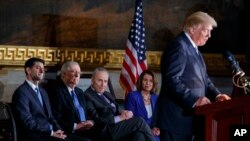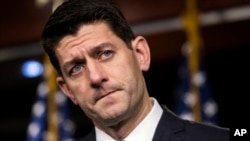House Republicans plan to go ahead with a vote on a temporary spending measure aimed at keeping the U.S. federal government open after a midnight Friday deadline.
U.S. President Donald Trump said Thursday a partial shutdown in government operations, the first since 2013, "could happen."
Trump threw the House of Representatives vote into doubt with a tweet that indicated his opposition to part of the plan, but the White House and House Speaker Paul Ryan said later that the short-term measure has the president's support. Trump said it was up to opposition Democratic lawmakers to decide whether to vote to keep the government funded.
The White House and lawmakers have yet to reach accord on either a one-month temporary spending measure, which would be the fourth in recent months, or on a budget that funds operations through the end of the 2018 fiscal year on September 30.
Republican leaders in Congress, even though they control both the Senate and the House, have been struggling to cobble together support for a one-month spending measure extending funding to February 16. They have encountered opposition from conservative Republicans who want more spending for defense programs and some lawmakers who are reluctant to again support temporary funding legislation.
Trump tweeted his opposition to part of the package that would extend the children's health insurance program for six years, a priority for Democratic lawmakers. Republican leaders had hoped to win some Democratic votes for the overall spending package with inclusion of the insurance to offset any Republican votes they could lose.
Trump said on Twitter that he opposes including tens of billions of dollars for the health insurance program in the short-term budget. He said the children's health insurance "should be part of a long term solution."
“The president likes to do things in an unconventional way and he does it with his phone, but, he actually is helpful with our (Republican) members,” Ryan commented.
And then there's immigration
Immigration issues also are complicating the budget negotiations. Numerous Democratic lawmakers have said they will not vote for any funding plan unless it includes protection against deportation for about 800,000 young immigrants, who years ago were brought illegally to the United States by their parents.
Trump last year ended the program protecting them from deportation, but gave Congress until March 5 to weigh in on the issue.
At her Thursday press briefing, Democratic leader Nancy Pelosi reiterated that Democrats would not be supporting the temporary spending bill, but said the immigrants, called Dreamers by their advocates, are not the only hold up.
“Even if not one Dreamer ever existed, we would still have a problem,” she said, adding that the real issue with the budget negotiations is the "lack of willingness of Reps ((Republicans)) to support a domestic agenda increase."
Pelosi said an agreement on the Deferred Action for Childhood Arrivals (DACA) program is possible before the deadline Friday. “The president told us [Wednesday]...he wants to get DACA done. We want to do what the president wants to do.” She added it would be helpful if Trump provided "a little more clarity."
Trump has said that any immigration provision that protects the immigrants also must include several provisions, including money for construction of a wall along the U.S.-Mexican border to thwart more illegal migration, a key Trump campaign vow in the 2016 election.
Shutdown
In another Thursday tweet, Trump said, "A government shutdown will be devastating to our military," which he contended that opposition Democratic lawmakers "care very little about!"
Even if the temporary spending measure is approved in the House, its passage in the Senate is far from certain.
Republicans hold only a 51-49 majority in the Senate and two Republicans have already announced their opposition, meaning Republican leaders will have to convince numerous Democrats to support it in order to reach the required 60-vote supermajority to approve the spending plan.
A partial U.S. government shutdown last occurred in 2013, a standoff over health care policies that lasted 16 days, furloughed hundreds of thousands of federal workers and curtailed government services throughout the country.





